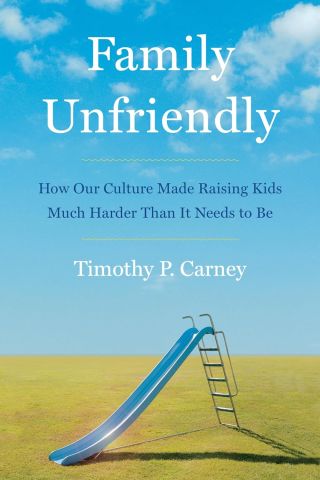Career
How Men Can Help Resolve Tensions Between Work and Family
A conversation with the author of "Family Unfriendly."
Posted April 23, 2024 Reviewed by Michelle Quirk
Key points
- American Enterprise Institute senior fellow Timothy Carney argues for a return to a focus on family.
- Men should use their cultural power to set the expectation that family is more important than work.
- We must address the childhood anxiety epidemic that flows from the quality-over-quantity parenting approach.
Most of the decisions we make in life are based on our personal preferences and circumstances and are usually a series of tradeoffs or compromises. For those who end up in high-powered careers that require endless hours on the job and being able to pick up and move across the globe, something, oftentimes family (if we have one), becomes less important.
In his new book Family Unfriendly: How Our Culture Made Raising Kids Much Harder Than It Needs to Be, American Enterprise Institute senior fellow Timothy Carney passionately argues for a return to a focus on family. He is clear about his religious and personal values and how they drive his argument, and even though most of us don’t have as many kids as he does, at least for me, his arguments for why family is valuable resonate and seem to be an underappreciated discussion point about what might be slowly pulling apart the basic fabric of society. What follows is a Q&A with him about high-powered work and mobility, how men can lead the way to change work expectations to support women, and how values matter in society.
Similar to Claudia Goldin’s work on career and family, when it comes to high-powered careers (including your own), there are constant tensions between the division of labor at work and at home, and the need to be mobile and often in larger, higher-cost-of-living cities away from family. For example, rural brain drain is currently a major issue. What might be some solutions?
Timothy Carney: Author Chris Arnade describes the “front row” of America as “mobile, global, and wired.” The brain drain you discuss happens because the elite institutions (employers and colleges) suck the “front row” kids out of small-town and rural America.
This is obviously bad for the small towns and the rural areas. They lose their would-be PTA presidents, their would-be civic leaders, and their would-be local pastors. The result is weaker institutions of civil society. The result of that is people’s lives collapsing: deaths of despair, broken politics, men dropping out of the labor force, less marriage, and less family formation.
Another bad effect of a hyper-mobile elite is a ruling class that doesn’t value place, roots, and tradition. At the highest heights of our media, our government, and our academia are folks who felt that the first step on the road to success was outgrowing where they came from. What’s worse, when they land in the mobile, global, and wired tribes that bounce among New York, D.C., London, et cetera, they think that they have also risen above tribalism—and, thus, they confuse their worldview with an objective worldview.
Solutions are tough. We can hope that the ongoing revolution in remote work will revitalize small towns and rural communities—that the folks with the most social and intellectual skills will be able to make a living and hold challenging jobs right where they grew up. But the early geographic patterns in remote work tell a different story: It’s all bureaucrats and tech folks.
Higher-cost metro regions could become more affordable for families in two ways: First, build more housing optimized to families. This includes garden apartments and starter homes. Second, encourage more employment to shift from the city center to the second-ring suburbs, alleviating the housing pressure on the city and the inner suburbs. And finally, in places like Washington, D.C., and Kansas City where we have crime epidemics, get serious on crime, thus making the cities more welcoming and alleviating the housing pressure on the suburbs.
You argue that men need to lead the way in changing workplace expectations. How will this help?
TC: You already mentioned Claudia Goldin. She finds that the pay gap between men and women is entirely due to mothers demanding more flexibility in order to take care of their kids.
The standard feminist response to this has been to say “Let’s relieve mothers of their caregiving duties.” I think that’s misguided, and the approach hasn’t worked.
I think what we need is universal acknowledgment in the workplace that work comes second to family.
In Family Unfriendly, I quote a study about gender attitudes in a particular high-powered workplace. One woman said, “When a man left at 5 p.m., people at the office assumed he was meeting a client ... When a woman left, they assumed she was going home to her children.”
I argue thus: “If, in fact Matthew is leaving for a meeting while Mary is leaving for family time, Mary has chosen the better part. If, instead, Matthew is merely using these assumptions as a cover for going home, he needs to fess up.”
Men in senior positions should make it clear that family comes first. If they are fathers, they should demand—and take advantage of—flexibility for the sake of family time. This isn’t primarily about paternity leave. It’s mostly about leaving at 5 p.m. on a given day and declaring “My family needs me home for dinner.”
I write in my book that we need “men using their cultural power to set the expectation that family is more important than work. The more dads do this, the less employers can punish the moms for demanding flexibility.”

You are Catholic, and the arguments you espouse flow from your values. Won’t it be challenging to change the values of people who don’t share the same faith or interest in religion or community?
TC: Yes and no.
A huge part of my book is drawing connections across various belief systems and traditions. I talk about the family-friendly aspects of the Church of Latter Day Saints, modern Orthodox synagogues, protestant churches, and the library system and rec department of Montgomery County, Maryland.
The arguments I make for more family support and more family formation range from the spiritual to the economic to the psychological.
And, ultimately, every good person should agree that we need to address the epidemic of childhood anxiety that flows from the intensive quality-over-quantity approach to parenting.
But, yes, there’s a limit to my argument. If you don’t think that humans are inherently social creatures who need community to thrive, I don’t have that much to offer you. If you think individual autonomy is the highest good, then my book is an argument that you are wrong.
There’s a reason that religiosity seems to cause high birth rates. It’s not so much because of commandments and teachings as it is values and community. Our secular culture gives less priority, I believe, to sacrificing for others and to lifelong commitment. Our secular culture also has a grimmer view of the future—and less hope.
I’d hope that my book can bring along some people who lean toward despair and alienation and convince them to embrace commitment, community, and, most importantly, family.
References
Carney, T. P. (2024). Family Unfriendly: How Our Culture Made Raising Kids Much Harder Than It Needs to Be. HarperCollins.
Jonathan Wai. How Can Women Overcome The Challenges Of Greedy Work And Couple Equity For Career And Family? Forbes. March 25, 2022.




